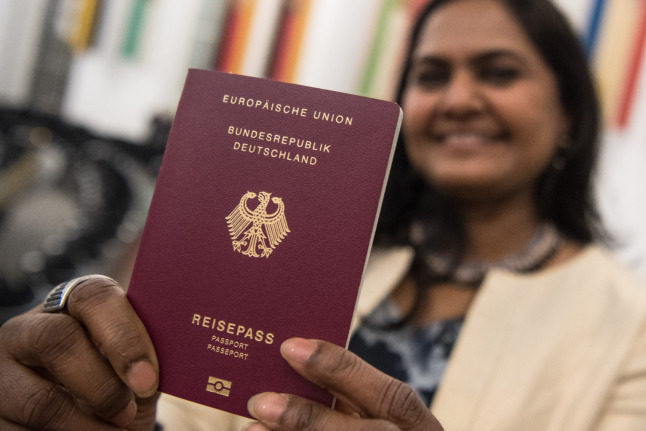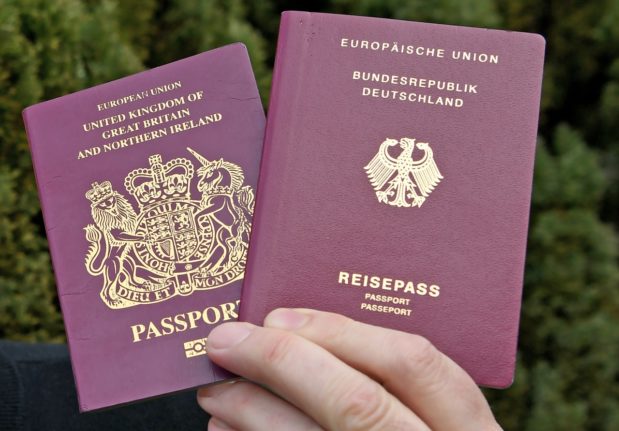After over a year of preparation by Germany’s traffic light coalition – leaving many internationals waiting to see when the promise to allow dual citizenship would finally be fulfilled – the draft law is finally out of the gate.
Currently circulating around the other government departments for agreement, the Interior Ministry is expected to present its citizenship reform to the Bundestag late this month or in February. Parliamentarians have previously told The Local that they’re hoping the law will pass by summer.
“I’m assuming the draft law will now be tackled quickly,” Stephan Thomae, the FDP parliamentary rapporteur for the law, tells The Local. “I don’t expect any major problems here. The current draft law contains no big surprises.”
READ ALSO: INTERVIEW: Germany on track to pass dual citizenship despite opposition
“I for one am hoping that this law goes through quickly,” tweeted Mark Furness, a researcher living in Bonn.
With some districts, like Berlin’s Pankow, with a current wait time of two years, some are already making their first appointments now – betting that the law will change by the time officials would normally get around to asking for proof of renouncing previous citizenships.
Dual citizenship is about to be legalized in Germany. I cried this morning. Both in happiness, that it’s finally happening, and in anger over the last ~20 years I’ve spent waiting for suffrage.https://t.co/MPBjh4S06b
— Myrle Krantz (@myrleKrantz) January 7, 2023
For its part, the Interior Ministry is remaining tight-lipped, telling The Local that its “recently submitted the draft of a law to modernise nationality to the internal government vote. Therefore, no statement can be made about specific content at present”.
However, we already know quite a bit about what’s likely to be in the law – if it passes all the hurdles. First up, non-EU nationals will get the right to naturalise as German without giving up their previous citizenships. Germans naturalising in a non-EU country will also get to remain German. Current German law generally restricts dual citizenship – meaning many applicants have to renounce their previous passports.
The new law will also shorten the time someone has to be in Germany from eight years to five, with some well-integrated people even being able to naturalise after three years.
READ ALSO: KEY POINTS: What’s in Germany’s draft law on dual citizenship?
The traffic light coalition parties have also been drumming up support for the draft law by highlighting its benefits to various parts of German life.
The liberal Free Democrat (FDP) Stephan Thomae, a parliamentary rapporteur for the law, highlighted the economic benefits to Welt newspaper.
“We want to enable foreigners who meet certain requirements and want to become part of our society to get German citizenship more quickly,” he said. “Because when someone has integrated well, that’s a success that we want to reward, but it also helps make Germany more attractive to foreign workers.”
Others have been taking to social media about the positives of the planned law changes.
Making it possible to obtain German citizenship after 5y (3 in special circumstances) makes skilled migration, especially for PhDs and postdocs, more attractive.
Come to 🇩🇪, get a PhD, learn some German, get citizenship and launch a great European career! https://t.co/d5z5x2DQDW
— Bradley Ladewig (@BradLadewig) January 8, 2023
Conservatives push back
But, of course, not everyone is happy.
Although parliamentarians and political experts The Local spoke to don’t believe the conservative Christian Democrats can block dual citizenship – as they did in the German upper chamber, or Bundesrat, in 1999 – the Christian Democratic Union (CDU) is pushing back hard against the reforms.
“The traffic light plans seem to me to be a devaluation of German citizenship,” CDU MP Thorsten Frei told Welt newspaper. “The SPD and the Greens want naturalisation without integration efforts.”
Meanwhile, Bavarian interior minister Joachim Herrmann of the Christian Social Union (CSU), came out strongly against the reform’s plans to abolish language tests for people aged 67 and older, primarily intended to make it easier for people from the “guest worker generation,” some of whom have lived in Germany since the early 1960s, to get citizenship.
“If someone came to Germany 30 years ago and still doesn’t speak German, something didn’t work out,” he said.
EXPLAINED: Could Germany’s conservatives block dual citizenship?



 Please whitelist us to continue reading.
Please whitelist us to continue reading.
Member comments